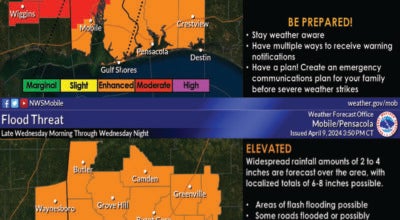Tax-payer guidelines released regarding tax relief in state
Published 10:10 am Monday, December 21, 2020
|
Getting your Trinity Audio player ready...
|
Earlier this month, Alabama Governor Kay Ivey issued a proclamation regarding how taxpayers can expect ‘stimulus payments’ to impact their final tax bill in the State of Alabama.
The proclamation outlined guidance items for individual taxpayers as well as business and corporate taxpayers.
To learn more about the proclamation and how it may impact the bottom line for taxpayers in Alabama, visit the Alabama Department of Revenue website at www.revenue.alabama.gov.
Guidance for Alabama Individual Income Taxpayers:
A. The following CARES Act benefits are not included in the calculation of an individual taxpayer’s 2020 Alabama income liability.
1. Economic Impact Payments (commonly referred to as “Stimulus Payments”) received by the taxpayer during 2020.
2. Principal or interest payments incurred by an employer on behalf of the taxpayer on any qualified education loan that is excluded from the employee’s federal gross income pursuant to IRC Section127(c)(1)(B), as amended under Section 2206(a) of the CARES Act. NOTE: Other forms of educational assistance as defined in IRC Section 127(c)(1)(A) and (C), provided by the taxpayer’s employer (including but not limited to payments of tuition, fees, and similar payment, books, supplies, and equipment, and the provision of courses and related materials and equipment) continue to be includable in the calculation of Alabama income tax.
3. Amounts received from the state Coronavirus Relief Fund (CRF), including for example Revive Alabama and Revive Plus grant funds received by the taxpayer to reimburse qualified expenses incurred due to business interruptions caused by the Coronavirus (COVID-19) pandemic and related business closures. NOTE: In calculating their 2020 Alabama income tax liability, taxpayers may not deduct expenses for which the taxpayer was reimbursed with CRF grant funds.
4. Qualifying disaster relief payments received by the taxpayer that would be excluded from federal income taxation under IRC Section 139 as a result of the Presidential Proclamation on Declaring a National Emergency Concerning the Novel Coronavirus Disease (COVID-19) Outbreak.
5. Amounts for which the taxpayer has received loan forgiveness under the CARES Act Paycheck Protection Program (PPP). NOTE: In calculating their 2020 Alabama income tax liability, taxpayers may not deduct expenses paid with PPP loan amounts that have been forgiven or that the taxpayer reasonably expects to receive forgiveness even if the taxpayer has not submitted an application for forgiveness of the loan by the end of the 2020 tax year.
For additional guidance of the deductibility these expenses please refer to Internal Revenue Service (IRS) Rev. Rul. 2020-27 and Rev. Proc. 2020-51. December 18, 2020 B. Calculation of Federal Income Tax Deduction for Individual Income Taxpayers. According to guidance issued by the IRS, eligible individual taxpayers who did not receive the full amount of their federal Economic Impact Payment may claim a “Recovery Rebate Credit” on their 2020 federal income tax return. In accordance with the provisions of the Proclamation, the worksheet to be included in the Department’s instructions for the 2020 Form 40, Form 40NR, and Form 40A for the calculation of taxpayers’ Federal Income Tax Deduction has been modified to exclude any adjustment for Recovery Rebate Credits claimed by taxpayers on their federal return.





